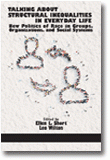
Talking About Structural Inequalities in Everyday Life
New Politics of Race in Groups, Organizations and Social Systems
Edited by:
Ellen L. Short, Long Island University
Leo Wilton, Binghamton University
Published 2016
The book, Talking About Structural Inequalities in Everyday Life: New Politics of Race in Groups, Organizations, and Social Systems, provides critical attention to contemporary, innovative, and cutting‐edge issues in group, organizational, and social systems that address the complexities of racialized structural inequalities in everyday life. This book provides a comprehensive focus on systemic, societal, and organizational functioning in a variety of contexts in advancing the interdisciplinary fields of human development, counseling, social work, education, public health, multiculturalism/cultural studies, and organizational consultation. One of the most fundamental aspects of this book engages readers in the connection between theory and praxis that incorporates a critical analytic approach to learning and the practicality of knowledge. A critical emphasis examines how inequalities and power relations manifest in groups, organizations, communities, and social systems within societal contexts. In particular, suppressing talk about racialized structural inequalities in the dominant culture has traditionally worked to marginalize communities of color. The subtle, barely visible, and sometimes unspeakable behavioral practices involving these racialized dynamics are explored. This scholarly book provides a valuable collection of chapters for researchers, prevention experts, clinicians, and policy makers, as well as research organizations, not‐for‐profit organizations, clinical agencies, and advanced level undergraduate and graduate courses focused on counseling, social work, education, public health, organizational consultation and advocacy.
CONTENTS
Endorsements. Foreword. Preface. PART I: STRUCTURAL INEQUALITIES FOR INDIVIDUALS OF COLOR AND MENTAL HEALTH. Between Rage and a Hard Place: A Cautionary Tale of Colin Ferguson, Racial Politics, and Caribbean American Mental Health, Schekeva P. Hall. Africana Women’s Ways of Coping with Traumatic Life Events: A Meta‐Ethnography, Nyasha Grayman‐Simpson, Jacqueline S. Mattis, and Nenelwa Tomi. Systemic and Workplace Microaggressions and the Workplace: Recommendations for Best Practices for Institutions and Organizations, Aisha M. B. Holder and Kevin L. Nadal. The Impact of Microaggressions and Structural Inequalities on the Well‐being of Latina/o American Communities, David P. Rivera, Rebecca Rangel Campón, and Krista Herbert. Hidden in Plain Sight: Structural Inequalities and (In)visible Violence in the Lives of African American Women, Carolyn M. West. Tipping the Scale: Implementation of The Project SisterCircle Intervention to Facilitate Youth Coping with the Effects of Structural Inequalities, Wendi S. Williams and Janee Nesbitt. Ethnoviolence as Structural Inequality: Media Representations of Black/African Descent Women, Wendi S. Williams, Ellen L. Short, and Dianne Ghiraj. “Black Lives Matter”: Structural Violence, Agency, and Resiliency in Black Transgender Women’s Communities, Leo Wilton and Ellen L. Short. Race, Sexuality, AIDS, and Activism in Black Same‐Gender Practicing Men’s Communities in Post‐Apartheid South Africa, Leo Wilton. PART II: STRUCTURAL INEQUALITIES AND INSTITUTIONS. A Critical Examination of Educational Disparities in Asian American and Pacific Islander Communities, Dina C. Maramba and Xavier J. Hernandez. Racialized Perspectives on the Prison Industrial Complex, Alex L. Pieterse. The Efficacy of Programmatic Initiatives on Improving the Graduation Rates of Black Male Collegians, Jameel A. Scott, Kourtney P. Gray, Christopher C. Graham,and Robert T. Palmer. Racial Inequalities and the Assessment of Intelligence: A Brief Historical and Interdisciplinary View, Lisa A. Suzuki and Cherubim A. Quizon. PART III: ORGANIZATIONAL AND GROUP DYNAMICS AND STRUCTURAL INEQUALITIES. The Race Idea Tends to Make People Wicked” An Exploration of Why It Persists, Charla Hayden, Anita Hill and Clarence Thomas, Nafissatou Diallo and Dominique Strauss‐Kahn. A Group Relations Perspective: Black Women, Feminism, and the Act of Giving Voice, Ellen L. Short. Reclaiming The Human: Exploring Caste Through The Lens of Group Relations Conference Experiences, Rosemary Viswanath. About the Authors.
-
Paperback9781681233840
Web price: $45.04 (Reg. 52.99)
-
Hardcover9781681233857
Web price: $80.74 (Reg. 94.99)
- eBook9781681233864

- EDU036000 - EDUCATION: Organizations & Institutions
- SOC000000 - SOCIAL SCIENCE: General
- SOC031000 - SOCIAL SCIENCE: Discrimination & Race Relations
-
 Anchoring Cultural Change and Organizational Change
Case Study Research Evaluation Project All Hallows College Dublin 1995-2015
Anchoring Cultural Change and Organizational Change
Case Study Research Evaluation Project All Hallows College Dublin 1995-2015
-
 Diversity as Strategic Opportunity
Exploring New Paths to Good Administration
Diversity as Strategic Opportunity
Exploring New Paths to Good Administration
-
 Forgotten Minorities in Organizations
Forgotten Minorities in Organizations
-
 Imagining the Future
Historically Black Colleges and Universities - A Matter of Survival
Imagining the Future
Historically Black Colleges and Universities - A Matter of Survival
-
 Institutional Diversity in American Postsecondary Education
Institutional Diversity in American Postsecondary Education
-
 The Plight of Stigmatized Groups in Organizations
The Plight of Stigmatized Groups in Organizations
-
 University in the 21st Century
University in the 21st Century

